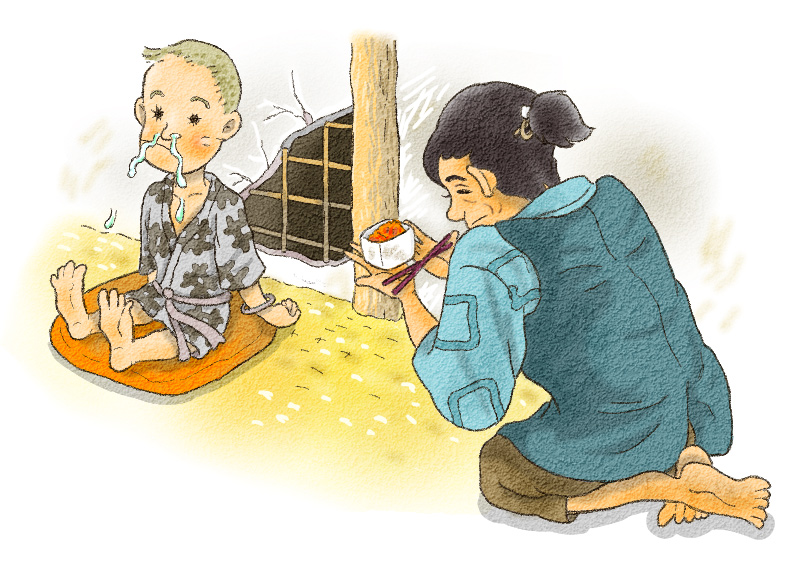福娘童話集(Hukumusume fairy tale collection) >日本昔話(Classical stories of the Japanese) >11月(November)
Anime size
Max 3840×2160 subtitles「Japanese」「English」
illustration 「Kaoru Mizushi」
鼻たれ小僧
Runny nose boy
にほんご(Japanese) ・えいご(English) ・Japanese&English
ほんやく(Translation) ちいさな翻訳屋さん
|
|||||||||
| ♪音声配信(html5) |
| 音声 ぬけさくのいちねん草紙 |
むかしむかし、たきぎを売って暮らしているおじいさんがいました。
Once upon a time, there was an old man. He sold firewood to make a living.

ある日の事、おじいさんはたくさんのたきぎを背負って町に行くと、
One day, the old man carried firewood on his back to town.
「たきぎ。たきぎ。たきぎは、いらんかのう」
“Firewood, Firewood! Anyone wants firewood?”
と、一日中大声をあげて売り歩きましたが、たきぎは少しも売れませんでした。
He walked calling aloud all day, but no one wanted the firewood.

おじいさんは疲れはてて、橋の上に座りこみました。
The old man was tired out and sat down on the bridge.
もう家まで、たきぎを持って帰る力もありません。
He felt too weak to take the firewood back home.

「売れない物なら、せめて川の神さまに差し上げよう」
“No one wants the firewood, so perhaps I should offer these to the God of River.”
おじいさんはたきぎを一束ずつつかんで、川へ落としました。
The old man held a bundle of firewood at a time and dropped them into the river.
「川の神さま。つまらぬ物ですが、受け取ってくだされ」
“The God of River, please accept my little offering.”
そして全てのたきぎを川へ投げ込んだおじいさんは、とぼとぼ家に帰ろうとしました。
The old man dropped all the firewood into the river. Then, he tried to go home with heavy feet.

するとその時、川の中から小さな子どもを抱いた美しい女の人が現れたのです。
It was when a beautiful lady appeared from the river. She was holding a little child.
「わたしは、川の神さまの使いです。川の神さまは、たきぎをいただいて大変お喜びです。お礼に、この子を差し上げましょう」
“I am on an errand for the God of River.The God of River is very happy to have your firewood.He offers this boy to you in return.”
それを聞いておじいさんは、あわてて手を振りました。
Listening to her, the old man shook his head quickly.
「いや、貧乏なわしに、子どもを育てる事なんて」
“No way, I am so poor, I cannot raise any child.”

「大丈夫です。この子は鼻たれ小僧と言って、欲しい物を頼めば何でも出してくれます」
“No worries. This boy is called a runny nose boy. Whatever you ask for, he will give you one.”
「本当ですか?」
“Is it true?”
「そのかわり、毎日エビを食べさせてください。いいですか、毎日ですよ」
“Yes, but in return, you need to feed him prawns every day. Please do not forget, you have to every day.”
女の人はそう言って、鼻たれ小僧を置いて消えました。
The lady told him so and left the runny nose boy.

おじいさんは鼻たれ小僧を家へ連れて帰ると、神だなの横に置いて大切に育てました。
The old man took the runny nose boy back home. He kept him next to the altar and looked after him well.

女の人が言った事は、うそではありませんでした。
What the lady told him was true.
「鼻たれ小僧よ、お米がほしい」
“Runny nose boy, give me some rice.”

と、言えば、鼻たれ小僧は鼻をかむ時のように『チンチーン』と音をたてて、あっという間にお米を出してくれるのです。
If he told him so, he made a sound like blowing his nose, “WAH-CHOO.”Then, in a second, he brought rice.

「鼻たれ小僧よ、お金がほしい」
“Runny nose boy, give me some money.”
「チンチーン」
“WAH-CHOO.”

「鼻たれ小僧よ、新しい家がほしい」
“Runny nose boy, give me a new house.”
「チンチーン」
“WAH-CHOO.”

「鼻たれ小僧よ、大きな蔵(くら)がほしい」
“Runny nose boy, give me a warehouse.”
「チンチーン」
“WAH-CHOO.”
おじいさんが頼めば何でも出してくれるので、やがておじいさんは村一番の大金持ちになりました。
The old man got whatever he asked for, and soon, he became the richest man in the village.

大金持ちなので、山へたきぎを取りに行く必要はありません。
Now he was rich, he did not have to go to the mountain to get firewood.

ただ毎日、町へ行って鼻たれ小僧に食ベさせるエビを買うだけです。
All he needed to do was to go to town to get prawns for the runny nose boy.

でもそのうちに、
But before long,

おじいさんはエビを買うのがめんどうになってきました。
The old man began to feel lazy about buying prawns.

ある日、おじいさんは鼻たれ小僧に言いました。
One day, the old man told the runny nose boy.
「もう頼む事がなくなったから、川の神さまの所へ帰っておくれ」
“I have nothing to ask for now, so go back to the God of River.”

すると、どうでしょう。
Then, what do you think happened?
ズーズーと、鼻をすするような音がしたかと思うと、
The runny nose boy made a sound like sniffling, “SNORT.”

立派な家も蔵も何もかもが消えてしまったのです。
The old man’s grand house, warehouse, and everything else disappeared.
あとには、むかしのままのみすぼらしい家が残りました。
What was left was the shabby house he used to live in.
「じゃあ、さよなら」
“Good bye, then.”
鼻たれ小僧はそう言うと、川の方へ歩いていきました。
The runny nose boy greeted him so and walked to the river.

「まっ、待っておくれ、鼻たれ小僧」
“Oh, wait, Runny nose boy, please!”
おじいさんはあわてて後を追いかけましたが、もうどこにも鼻たれ小僧の姿はありませんでした。
The old man chased him in a haste but could no longer find the runny nose boy anywhere.

おしまい
The End
ワンポイントアドバイス(One point advice)
・「それを聞いておじいさんは、あわてて手を振りました」: “the old man shook his head quickly.”
英語では「無理、無理」といった否定の意を表す場合、手を振るのではなく「首を振る」という表現を使います。
・「チンチーン」「ズーズー」: “WAH-CHOO”、“SNORT.”
英語圏では、このような擬態語はあまり一般的に使用されていません。上記2点は比較的オリジナルに近いと思われるものです。“WAH-CHOO”は”achoo”(くしゃみの擬音語をもじったもの)、“SNORT”は「鼻をすすりあげる」という意味で時々擬音としても用いられます。
Bonus

| 11月 9日の豆知識 366日への旅 |
119番の日 |
数珠玉(じゅずだま) |
| きょうの誕生日・出来事 1984年 えなりかずき(俳優) |
| 恋の誕生日占い 鋭い洞察力で、チャンスを感じたらすぐに行動 |
| なぞなぞ小学校 お坊さんには無い癖は? |
| あこがれの職業紹介 ゲームサウンドクリエーター |
| 恋の魔法とおまじない 314 どちらが好きか迷った時は |
| 11月 9日の童話・昔話 福娘童話集 |
| きょうの日本昔話 鼻垂れ小僧(はなたれこぞう) |
| きょうの世界昔話 クジャクの花火 |
|
| きょうのイソップ童話 片目のシカ |
| きょうの江戸小話 将棋がたき |
| きょうの百物語 ともかづき |
福娘のサイト |
||||||
| 366日への旅 毎日の記念日などを紹介 |
||||||
| 福娘童話集 日本最大の童話・昔話集 |
||||||
| さくら SAKURA 女の子向け職業紹介など |
||||||
| なぞなぞ小学校 小学生向けなぞなぞ |
||||||




 boy
boy